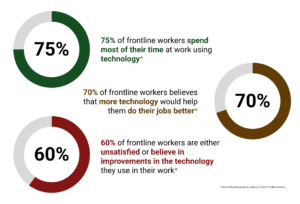
Looking through history, frontline workers have not been given much workplace flexibility. In most places, workers were expected to work on a set schedule, with no regard for personal life and unexpected situations.
However, workplace trends are shifting towards work-life balance and worker-first cultures, with increased pressure on employers to support and promote workplace flexibility for their workers. With the help of the right HR technology, companies can adopt new approaches to increase flexibility for their employees.
Related articles:
Workplace Trends Every Organization Should Know
How Can AI Automation Affect Future Trends and Challenges in HR?
A History of Inflexibility for Frontline Workers
80% of the global workforce does not sit behind a desk in an office to do their work, instead, they are on the frontline
Forbes
However, looking back in time, frontline workers have not been prioritized when it comes to workplace standards and the work environment with part-time employees has not been famous for its workplace flexibility.
The frontline workers have been tied down in strict working hours and last-minute calls to come into work. If workers got in a situation where they had to get off their shift, they had expectations on them to make work arrangements by themselves to solve their “own problem”. Many times, this involves numerous phone calls to colleagues.
Some companies even had policies against swaps of shifts. In these cases, parents had to leave their sick children at home because they were unable to find someone to take their shift. Unwell employees had to show up to work, no matter how they felt.
Lack of flexibility in working for frontline workers brought high levels of stress and frustration, and in some cases, it could lead to burnout.
The Importance of Workplace Flexibility

You might be wondering, why is everyone talking so much about workplace flexibility. Not only is the world changing its approach with an expectation for work-life balance and a worker-first culture, but there have been reportedly benefits of workplace flexibility. This includes increased employee engagement, performance, retention, and more.
Not only does workplace flexibility bring numerous benefits to a company and its employees, but by offering flexibility a company acknowledges and respects that its employees have a life outside of work.
Pressure on Companies to Provide Workplace Flexibility
Throughout history, flexible work was considered an employee perk or benefit. Today, it is often considered a necessity, and companies that do not provide it for employees are risking losing their frontline talent to competitors.
As it has been reported that frontline workers are quitting their jobs in record numbers, companies need to adapt to employee expectations to keep their workers
Forbes
To do this, companies need to rethink their approach to work arrangements for frontline workers.
Technology Supports Workplace Flexibility for Frontline Workers
Research from Emergence shows that frontline workers are becoming more reliant on technology to do their jobs and the workers are increasingly demanding the proper tools to execute their work efficiently. With the right HR technology strategy, powered by AI and robotics, workplaces can adapt and offer more flexible hours for all employees.

Below, we list the most important characteristics of employee technology to promote workplace flexibility for frontline workers:
Remote Workforce Management
During the pandemic, many job positions shifted to online work. However, frontline workers were one of the last working groups to be offered work-from-home possibilities. By the nature of their job, the majority of the work cannot be done remotely, but with cloud-based technology, companies can offer remote work opportunities to their frontline workers.

Areas that can be transferred into remote working for frontline workers include:
- Employee evaluations
- Daily/weekly meetings
- Job interviews
- And more
Every workplace operates differently, but by looking through your daily operations you can identify areas where you can increase work flexibility through remote working.
Communication Tool
Allow for more flexibility in the workplace with a communication tool to support collaboration and easy communication between colleagues and managers. The technology helps workplaces move past phone calls made from private phones between colleagues to swaps of shifts by offering a cloud-based solution where workers can easily send requests for time off, overtime, or contact other employees.
Flexible Scheduling
HR software supports more predictable working hours with an online work scheduling that allows staff members to get an overview of alternative work hours and possible work arrangements. The technology allows employees to plan their work and gain a more flexible work schedule, without the last-minute calls that push into the weekends. This flexibility can be particularly beneficial for parents, allowing them to better manage family responsibilities and potentially optimize their eligibility for child tax credits and other financial support programs.
Technology can also help support more modern initiatives such as adopting a four-day work week into your organization.
Supporting frontline workers with the right tools and technology is a crucial part of the employee experience, which is highlighted in a survey:
Workers who have flexible scheduling tools – i.e., tools that enable them to manage their schedules and adjust and add shifts – are 71% more likely to say their company is open and transparent
Workday
With proper technology that supports flexible scheduling, you can also expect an increase in job satisfaction and happier employees.
PeopleSpheres: Consolidates All Your HR Software
PeopleSpheres connects all your HR software on a single platform, optimizing the employee experience with your HR tools. Make it easy for workers to trade shifts or reschedule their working hours on a consolidated platform.
For a personalized demonstration based on your specific needs for your frontline workers, contact our experts and we will get back to you within 1 business day.

-360x360.jpg)
-640x380.jpg)
-1-640x380.jpg)
-640x380.jpg)